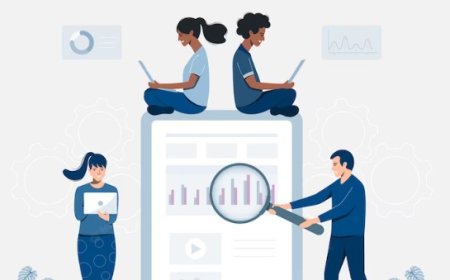Using Data Analytics for Competitive Advantage in Business
Explore business success with data analytics. Exploit data insights for a competitive edge. Discover the power of data analytics in gaining a strategic advantage.

Data analytics is a big deal in business today. It helps companies make smart choices by looking at data. More and more, businesses use data to decide what to do. Everyone's doing it, and it's a tough world out there. Companies need to keep up or they might fall behind. So, data analytics is a key tool for making decisions and staying competitive. It's like using a map to find the best path in a busy city. Businesses use data to find the best path to success.
Challenges in Using Data Analytics:
Many businesses today use data analytics, which is like a tool to help them understand information better. But sometimes, they face problems. One big problem is that they might have a lot of data, but it's not always easy to turn it into useful information. Imagine having a huge puzzle with missing pieces; it's tough to see the whole picture. Also, some businesses might not have the right people or skills to use data analytics well. It's like having a fancy tool, but not knowing how to use it.
Impact of Not Using Data Analytics:
In a world where everything relies on data (like knowing what people like to buy or what's popular), not using data analytics is a bit like going on a long road trip without a map. Businesses might make decisions that aren't very smart because they don't have the right information. Imagine a chef cooking without knowing what ingredients are in the kitchen – the food might not turn out great. So, not using data analytics can make businesses miss out on making money or doing better.
The Growing Amount of Data:
Nowadays, there is so much information, like pictures, numbers, and words, being created every day. It's like a mountain that keeps getting bigger. But the problem is, not all of it is useful, and finding the important stuff is like looking for a needle in a haystack. Businesses need to be like detectives and figure out what's important. It's a bit like cleaning a very messy room – it takes time, effort, and the right tools to make sense of it.
What strategies can businesses employ to harness the power of data analytics for a competitive advantage?
-
Start by gathering information about your business, customers, and market. This could include sales figures, customer preferences, and online behavior.
-
Keep this data in a well-organized system. This makes it easier to access and analyze when needed.
-
Use software or tools to dig into your data. Look for patterns, trends, and insights that can help your business. For example, figure out what products are most popular and why.
-
Understand your customers better. Learn what they like and dislike. This helps you tailor your products or services to their needs.
-
Data analysis helps you make smarter decisions. You can forecast trends, plan inventory, and adjust your marketing strategy based on what the data tells you.
-
Compare your data with what your competitors are doing. This can show you where you're doing well and where you need to improve.
-
Use data to send personalized offers and recommendations to your customers. This can increase sales and customer loyalty.
-
Identify areas where you can cut costs by analyzing data. Maybe there's waste in your operations that you can eliminate.
-
Encourage customer feedback and use it to improve your products and services continually.
-
Protect your data from breaches. Losing data or having it stolen can hurt your business.
-
Train your employees to understand and use data effectively. They can help implement data-driven decisions.
-
Data analytics is always evolving. Keep up with the latest tools and techniques to stay competitive.
Businesses can gain a competitive advantage by using data to understand their customers, make better decisions, cut costs, and improve their products and services. It's like having a secret weapon that helps you stay ahead in the business world.
How can businesses overcome the challenges associated with data analytics?
Businesses can overcome challenges in data analytics by taking practical steps.
- First, it's important to set clear goals. Know what you want to achieve with data analytics, like improving sales or customer satisfaction. Start with specific objectives in mind.
- Next, gather the right data. Ensure you collect the information that is relevant to your goals. This might include customer data, sales figures, or market trends.
- Good data quality is crucial. Dirty or inaccurate data can lead to wrong decisions. Regularly clean and update your data to maintain its accuracy.
- Invest in user-friendly analytics tools. Choose software that is easy for your team to use. This can help them extract insights without a steep learning curve.
- Training your employees is vital. Provide training on how to use analytics tools effectively. A skilled workforce can unlock the potential of your data.
- Collaboration is key. Encourage different teams in your organization to work together. Share insights and knowledge to get a more comprehensive view of your data.
- Privacy and security are paramount. Protect sensitive data and ensure you comply with data protection regulations. A data breach can be costly and damage your reputation.
- Lastly, stay flexible. The data landscape evolves, so be open to change. Adapt your analytics strategy as needed to stay ahead.
By following these practical steps, businesses can better harness the power of data analytics and overcome the challenges they may encounter.
What are the potential benefits of using data analytics for decision-making and staying competitive?
Using data analytics to make decisions and stay competitive is like having a secret weapon for businesses. It's a way to collect, analyze, and use data in a smart way to make better choices and outshine the competition.
Firstly, data analytics helps in understanding customers better. By looking at data, companies can figure out what their customers like and dislike. This means they can create products and services that people actually want. It's like being a mind reader for your customers.
Secondly, it helps in saving money. Businesses can look at data to find out where they are wasting money and make changes. This can mean more profit in the end. It's like finding spare change in your couch cushions.
Thirdly, data analytics can help businesses predict the future. By studying past data, companies can make educated guesses about what's going to happen. This can help them be prepared and stay ahead of the game. It's like having a crystal ball for your business.
Moreover, it can make operations smoother. Data can show where things are going wrong in a business and help fix those issues. This means things run more efficiently and customers are happier. It's like oil for the gears in a machine.
Lastly, it keeps a business in the race. With everyone using data analytics, not using it means being left behind. It's like trying to race a car with a bicycle.
Data analytics is like a magic tool that helps businesses make more money, understand their customers, and stay ahead of the competition. It's a smart move for any company looking to succeed in today's fast-paced world.
Using data analytics in business can give you a competitive edge. It helps you make smarter decisions by analyzing data to understand customer preferences and market trends. With this information, you can tailor your products and services to meet customer needs, improve efficiency, and reduce costs. Data analytics also enables you to spot opportunities and potential issues early, giving you a head start in the market. Plus, it helps in better marketing, as you can target the right audience with personalized messages. So, embracing data analytics can boost your business's success, making it more competitive and adaptable in today's fast-paced world.




























































